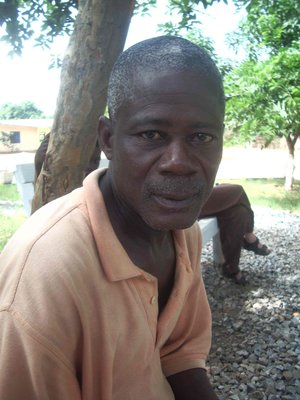Difference between revisions of "Felix Kalabo"
| Line 30: | Line 30: | ||
[[Category: Dagbamete born 1960s]] | [[Category: Dagbamete born 1960s]] | ||
| + | |||
| + | [[Category: Currently Residing in Dagbamete]] | ||
| + | |||
| + | [[Category: Born Outside of Dagbamete]] | ||
Revision as of 13:52, 13 November 2009
Name: Felix Kalabo “Thirteen"
Age: 47
Gender: Male
Birthplace: Anloga
Place of Residence: Dagbamete
Religion: Traditional
Occupation: Dancer and help at Apetorku Shrine
Felix Kalabo has completed Form 4, and works as a mechanic. His musical proficiencies are dance and he is a member of Unity musical group. Felix learnt to dance as a young boy in school. At the age of 39 he joined the group Unity and learnt to dance with them. The music he learnt in his childhood include Afavu, Truykpi and Abgada. Music will be continued to be taught at schools, and someone in his home village would play music while all the children will come to learn from him. [same as in Dagbamete]. He does not think that music will be forgotten. Music has stayed the same since childhood, and new music has come such as high-life. This has caused no problems because both young and old listen to high-life.
Interviewed by Jennifer Hermann in July 2008
Second Interview
Thirteen is a member of the Unity drumming group in which he sings and dances. He is an active member of the Aptorku shrine, helping during rituals and celebrations. When I asked, “Has music in Dagbamete changed from when you were a small boy?”, his answer was, “No!” He had not seen any change in the shrine music or the Unity drumming music during his lifetime. Thirteen’s answer was an echo of the many other interviews that I had previously conducted. When I tried to ask about music on the radio and other popular music forms in the community he did not understand and replied, “Yes.” Due to his limited English and my non-existent Ewe, it was impossible for me to delve further into the musical changes of Dagbamete without the help of an interpreter.
Interviewed by Heather Perceval Summer 2009

